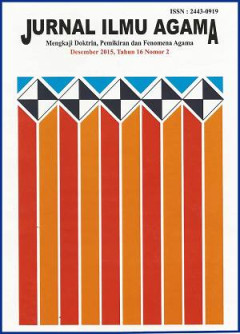Ditapis dengan

Media and Democracy in Turkey: Toward a Model of Neoliberal Media Autocracy. …
This paper reveals the ways in which media autocracy operates on political, judicial, economic and discursive levels in post-2007 Turkish media. Newsmakers in Turkey currently experience five different systemic kinds of neoliberal government pressures to keep their voice down: conglomerate pressure, judicial suppression, online banishment, surveillance defamation and accreditation discriminatio…
- Edisi
- Vol. 5 Issue 3
- ISBN/ISSN
- 1873-9857
- Deskripsi Fisik
- -
- Judul Seri
- -
- No. Panggil
- -

The Influence of New Media on Political Power Transition and Democracy Expans…
According to studies globally, new media excludes climatic and geographical boundaries from the scope of the power of governments. By influencing the feeling of personal security and freedom, it empowers people and facilitates the shaping of human behavioral elements. These technologies provide the necessary platform for the emergence of new actors and open competition with traditional powers, …
- Edisi
- Vol. 9 Issue 34
- ISBN/ISSN
- 2209-2536
- Deskripsi Fisik
- -
- Judul Seri
- -
- No. Panggil
- -

Modern Egyptian media: transformations, paradoxes, debates and comparative pe…
This article analyses the transition, complexity and dynamics of the modern Egyptian media landscape. It sheds light on some of the most important transformations, paradoxes and debates pertaining to this changing media landscape, and it explores some western theoretical perspectives and questions their validity as comparative perspectives for analysing modern Egyptian media. The article overvi…
- Edisi
- Vol. 1 Issue 3
- ISBN/ISSN
- 1751-9411
- Deskripsi Fisik
- -
- Judul Seri
- -
- No. Panggil
- -

Typology of Democratic Political Surveillance Processes in the Context of Dig…
The digital environment creates new opportunities for citizens' political participation. This oversight actually includes a general review of the management of public funds and the activities of public and economic systems, so political oversight processes, through democracy, in the digital environment, condemn inefficient features. The purpose of this article is to describe, differentiate and …
- Edisi
- Vol. 8 Issue 31
- ISBN/ISSN
- 2209-2536
- Deskripsi Fisik
- -
- Judul Seri
- -
- No. Panggil
- -

On the Road to Democracy: Egyptian Bloggers and the Internet 2010. E-JOURNAL
In authoritarian-ruled Arab societies, new media, exemplified by the Internet, are perceived as the harbinger of democracy. In interviews conducted in Egypt in 2009, I asked bloggers, human rights activists and journalists about their motivations for blogging, the nature of the relationship between blogging and traditional media practitioners and the challenges that hinder the efficacy of blogg…
- Edisi
- Vol. 4 Issue 2/3
- ISBN/ISSN
- 1751-9411
- Deskripsi Fisik
- -
- Judul Seri
- -
- No. Panggil
- 306.2

Building capabilities of Egyptian journalists in preparation for a media in t…
Egypt is going through a dramatic transition in its media sector. The proliferation of satellite and Internet technology combined with pressure to free the media and the government's relative acceptance of media openness have created an environment that has attracted many agencies, associations and foundations to invest in training programmes intended to develop the journalism profession. Thi…
- Edisi
- Vol. 1 Issue 3
- ISBN/ISSN
- 1751-9411
- Deskripsi Fisik
- -
- Judul Seri
- -
- No. Panggil
- -

FAKE NEWS: DISINFORMATION AND INFODEMY AS POSSIBLE THREATS TO DEMOCRACY. E-JO…
In recent years there has been a growing global debate on fake news, technically as "disinformation" and in recent months the expression "infodemic" coined by the WHO due to the COVID-19 pandemic. What these two terms have in common - and the object of this study - is the relationship they have with freedom of expression and the right to information, these fundamental and corollary rights o…
- Edisi
- Vol. 7 Issue 5
- ISBN/ISSN
- 2437-1181
- Deskripsi Fisik
- -
- Judul Seri
- -
- No. Panggil
- 306.2

Historical hopes, media fears, and the electronic town meeting concept: where…
Direct democracy has been advocated by utopian thinkers since the nineteenth century. Since the 1970s, a number of experiments have been conducted in regards to teledemocracy, yielding a rich insight on the relationship of technology to democracy. However, in the 1992 presidential campaign, the concept of "electronic town meeting" was introduced by Ross Perot and print media reported, editorial…
- Edisi
- Vol. 22, Issue 2
- ISBN/ISSN
- 0196-8599
- Deskripsi Fisik
- 9 Lembar
- Judul Seri
- -
- No. Panggil
- -

SYURA DAN DEMOKRASI: ANTARA TEORI DAN PRAKTEKNYA DALAM DUNIA ISLAM.
Shura and democracy are two concepts that seem substantially almost exactly the same, but these two concepts have differences because both have differences historically, culturally and structurally. The differences are further aggravated by the suggestion and the image that grows in some people that shura is identical with the teachings of Islam which is derived from Allah. In, fact democra…
- Edisi
- Vol 17, No 2 (2016)
- ISBN/ISSN
- 2443-0919
- Deskripsi Fisik
- -
- Judul Seri
- -
- No. Panggil
- 2X0 JUR

DEMOCRACY, ISLAM, AND RELIGIOUS FREEDOM IN INDONESIA: A SHORT POLITICAL AND R…
Indonesia, even though state gives a concession on moderate on religious matter, the phenomena shows that the radical Islamic group tries to intervene religious matter in Indonesia. Thus it might dangerous to manage the diversity that becomes national emblem. In this paper, I argue that democratic society should regulate and control religious …
- Edisi
- Vol 17, No 2 (2016)
- ISBN/ISSN
- 2443-0919
- Deskripsi Fisik
- -
- Judul Seri
- -
- No. Panggil
- 2X0 JUR
 Karya Umum
Karya Umum  Filsafat
Filsafat  Agama
Agama  Ilmu-ilmu Sosial
Ilmu-ilmu Sosial  Bahasa
Bahasa  Ilmu-ilmu Murni
Ilmu-ilmu Murni  Ilmu-ilmu Terapan
Ilmu-ilmu Terapan  Kesenian, Hiburan, dan Olahraga
Kesenian, Hiburan, dan Olahraga  Kesusastraan
Kesusastraan  Geografi dan Sejarah
Geografi dan Sejarah